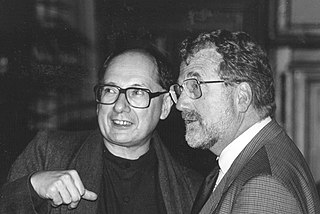Related Research Articles

The University of Basel is a public research university in Basel, Switzerland. Founded on 4 April 1460, it is Switzerland's oldest university and among the world's oldest surviving universities. The university is traditionally counted among the leading institutions of higher learning in the country.

Mary-Dell Chilton is one of the founders of modern plant biotechnology.

Jozef Stefaan "Jeff", Baron Schell was a Belgian molecular biologist.

Rose Rand was an Austrian-American logician and philosopher. She was a member of the Vienna Circle.
The Wittgenstein Award is an Austrian science award supporting the notion that "scientists should be guaranteed the greatest possible freedom and flexibility in the performance of their research." The prize money of up to 1.5 million euro make it the most highly endowed science award of Austria, money that is tied to research activities within the five years following the award. The Wittgenstein-Preis is named after the philosopher Ludwig Wittgenstein and is conferred once per year by the Austrian Science Fund on behalf of the Austrian Ministry for Science.

The Friedrich Miescher Institute for Biomedical Research (FMI) is a biomedical research institute founded in 1970. Based in Basel, Switzerland, the FMI is affiliated with the University of Basel and the Novartis Institutes for BioMedical Research (NIBR). It is named after Friedrich Miescher. As of 2021, the FMI has around 340 collaborators, of which 20 are research group leaders, over 80 are postdoctoral collaborators and over 80 are postgraduate students participating in the FMI International PhD Program. The FMI is directed by Dirk Schübeler.

Elisebeth Leinfellner was professor in linguistics at the University of Vienna, Department of Linguistics. She moved to the United States in 1967, and taught at Doane College in Crete, Nebraska, and at the University of Nebraska-Lincoln. She is notable for her contributions to linguistics and philosophy. She received the Austrian Grand Decoration of Honour for services to the province of Lower Austria for Science and Art. She co-founded the Austrian Ludwig Wittgenstein Society and International Wittgenstein Symposium.

Erich Nigg is a Swiss cell biologist.

Silvia Arber is a Swiss neurobiologist. She teaches and researches at both the Biozentrum of the University of Basel and the Friedrich Miescher Institute for Biomedical Research in Basel Switzerland.

The Ernst Schering Prize is awarded annually by the Ernst Schering Foundation for especially outstanding basic research in the fields of medicine, biology or chemistry anywhere in the world. Established in 1991 by the Ernst Schering Research Foundation, and named after the German apothecary and industrialist, Ernst Christian Friedrich Schering, who founded the Schering Corporation, the prize is now worth €50,000.
Susan M. Gasser is a Swiss molecular biologist. From 2004 to 2019 she was the director of the Friedrich Miescher Institute for Biomedical Research in Basel, Switzerland, where she also led a research group from 2004 until 2021. She was in parallel professor of molecular biology at the University of Basel until April 2021. Since January 2021, Susan Gasser is director of the ISREC Foundation, which supports translational cancer research. She is also professor invité at the University of Lausanne in the department of fundamental microbiology. She is an expert in quantitative biology and studies epigenetic inheritance and genome stability. Recipient of multiple swiss and European awards, she was named member of the US Academy of Sciences in 2022.
Ruth Chiquet-Ehrismann was a Swiss biochemist and cell biologist working on interactions in the extracellular matrix.

Erika Weinzierl was an Austrian historian, gender researcher, and historian of Nazism. A member of the Austrian People's Party and the Curatorium of the Austrian Mauthausen Committee, she was the second director of the Department of Contemporary History of the University of Vienna, succeeding Ludwig Jedlicka. Weinzierl was a recipient of the Austrian Decoration for Science and Art, the Preis der Stadt Wien für Geisteswissenschaften, the Benemerenti medal, and the Theodor Körner Prize.
Barbara Kraus is an Austrian physicist specializing in quantum information, quantum entanglement, and quantum key distribution. She is a University Professor at the TUM School of Natural Sciences at the Technical University of Munich.

Dirk Schübeler is a German researcher, Director of the Friedrich Miescher Institute for Biomedical Research (FMI) and professor at the University of Basel. He is an expert in gene regulation.

Adrian Constantin is a Romanian-Austrian mathematician who does research in the field of nonlinear partial differential equations. He is a professor at the University of Vienna and has made groundbreaking contributions to the mathematics of wave propagation. He is listed as an ISI Highly Cited Researcher with more than 160 publications and 11,000 citations.
Kan Wang is a Chinese-American agronomist. As a professor at Iowa State University, Wang was elected a Fellow of the American Association for the Advancement of Science for her "advances in genetic engineering in plants using Agrobacterium tumefaciens."

Nicolas H. Thomä is a German researcher, full professor at the EPFL School of Life Sciences and Director of the Paternot Chair for Cancer Research in Lausanne, Switzerland. He is a biochemist and structural biologist and a leading researcher in the fields of ubiquitin ligase biology and DNA repair.

Prisca Liberali is an Italian chemist who is a senior group leader at the Friedrich Miescher Institute for Biomedical Research. Her research takes a systems biology approach to understand the behaviour of multi-cellular systems. She was awarded the EMBO Gold Medal and EMBO Membership in 2022.
Howard M. Goodman is an American molecular biologist and a professor of genetics emeritus at Massachusetts General Hospital. He is best known for his role in founding the department of molecular biology at Massachusetts General Hospital.
References
- ↑ "Hohn, B. (Barbara), 1939-". Library of Congress Name Authority File. Library of Congress. Retrieved 2 November 2013.
- 1 2 "Barbara Hohn". FMI. 2013. Retrieved 19 October 2013.
- 1 2 "Dr. Barbara Hohn". AcademiaNet. Retrieved 2 November 2013.
- ↑ "Barbara Hohn honored with Ludwig-Wittgenstein-Preis". FMI. 7 October 2010. Retrieved 20 October 2013.